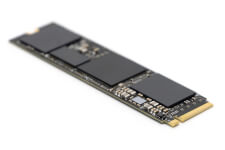Solid State
In the context of electronic devices, "solid state" refers to a component that has no moving parts. Solid-state components use solid materials like silicon to carry electronic signals, as opposed to the vacuum tubes and other mechanical components used by early electronics. The term is often used specifically to refer to solid-state flash storage drives (SSDs), in contrast to mechanical hard disk drives.
Many early computer storage devices were not solid-state devices, as they relied on moving parts to store data. For example, a hard disk drive stores data on spinning magnetic platters that are read by mechanical read/write heads; similarly, an optical drive reads data from a spinning disc using a movable laser. If a mechanical drive experiences a sudden movement while reading or writing data, it could skip and cause a read error or even permanent damage to the read/write heads and data platters. Solid-state drives use flash memory and have no moving parts that could be affected by sudden movements. This makes them far more durable and ideal for portable devices.
All modern electronics include solid-state components like transistors, diodes, and integrated circuits. Many computer components are entirely solid-state without any moving mechanical parts at all, including processors, memory chips, motherboards, and expansion cards. Smartphones, tablets, and laptop computers typically only include solid-state components — aside from accessory components like cooling fans, display hinges, keyboard keys, and power and volume buttons.
 Test Your Knowledge
Test Your Knowledge